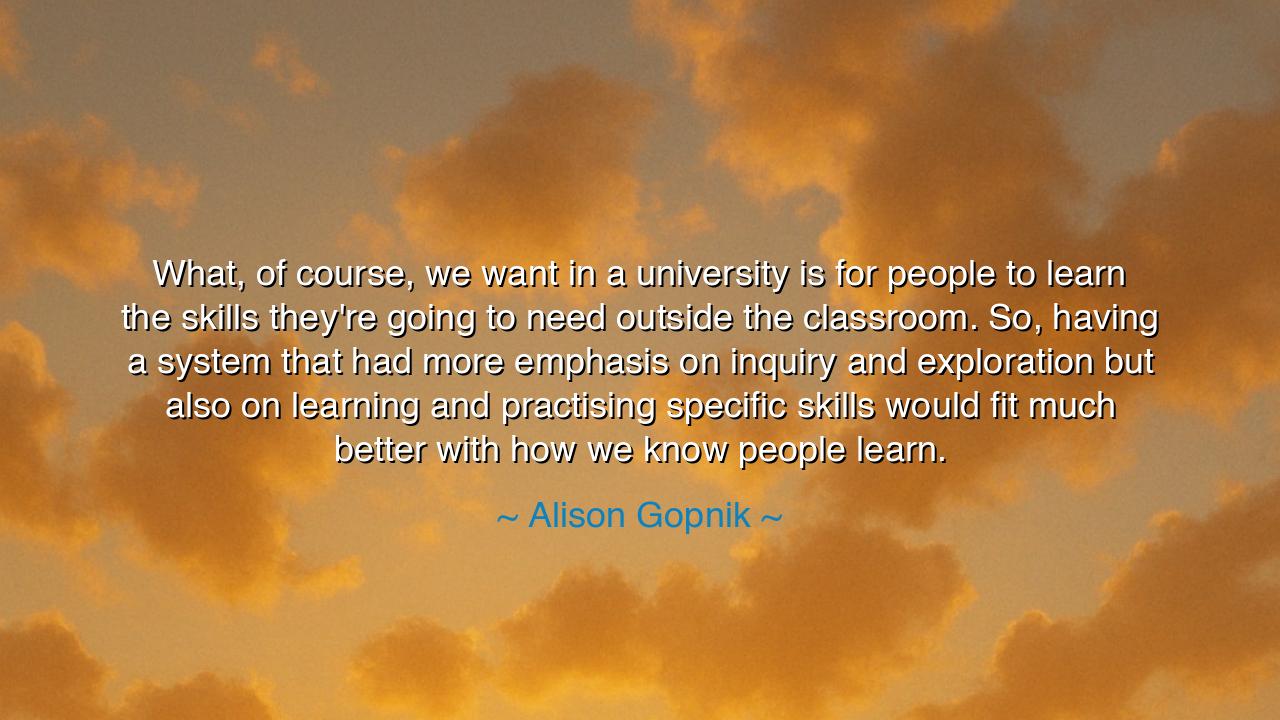
What, of course, we want in a university is for people to learn
What, of course, we want in a university is for people to learn the skills they're going to need outside the classroom. So, having a system that had more emphasis on inquiry and exploration but also on learning and practising specific skills would fit much better with how we know people learn.






In the voice of calm wisdom and timeless insight, Alison Gopnik spoke of education not as a factory of facts, but as a garden of growth: “What, of course, we want in a university is for people to learn the skills they're going to need outside the classroom. So, having a system that had more emphasis on inquiry and exploration but also on learning and practising specific skills would fit much better with how we know people learn.” These words, simple yet profound, are the cry of a philosopher of learning, one who sees beyond the walls of institutions and into the soul of human curiosity. For she reminds us that knowledge without practice is like a tree without fruit, and skill without inquiry is like a sword without a guiding hand.
The origin of this quote rests in Gopnik’s lifelong devotion to understanding how humans—especially children—learn and think. As a developmental psychologist, she has studied how wonder itself fuels intelligence, how play becomes the foundation of wisdom. Her insight into the world of learning is not abstract but deeply human: that education should imitate the way the mind naturally grows. It should not be a process of memorization and obedience, but one of exploration, experimentation, and creation. In this, her words recall the ancient academies where philosophers walked among olive trees, speaking not to instruct but to awaken.
To inquire is to set the soul in motion. To explore is to breathe life into thought. Gopnik’s vision of a university—one that unites curiosity with craft—calls us back to the essence of true learning. The great thinkers of old did not divide mind from hand, nor theory from action. In the workshops of Leonardo da Vinci, the artist was also the scientist; in the dialogues of Socrates, the question was as sacred as the answer. They understood what modern systems often forget: that the purpose of learning is not merely to pass exams or earn titles, but to prepare the spirit for the challenges of the world beyond the classroom.
Consider the story of Benjamin Franklin, who, though lacking formal university education, became one of the greatest thinkers of his time through inquiry and practice. He experimented with electricity not by reading of it, but by engaging it with his own hands and courage. His education was lived—each discovery a marriage of question and skill. Gopnik’s words echo this truth: that wisdom is not something bestowed by institutions, but something earned through curiosity and effort. A mind that only studies in theory is like a bird with one wing—it may flap, but it cannot soar.
Her call for a balance between inquiry and skill also reflects the eternal rhythm of mastery. The ancients spoke of the threefold path: learning, doing, and becoming. One must first seek knowledge, then apply it through practice, and finally integrate it into character. Modern education, in its obsession with measurement, often halts at the first step. It fills minds but forgets to shape hands and hearts. Gopnik’s wisdom is therefore a call to restoration—to rebuild the sacred bridge between thought and action, between understanding and creation.
Moreover, her insight carries a moral truth. For to teach inquiry is to teach freedom, and to teach skill is to teach responsibility. Inquiry without skill drifts into idle speculation, but skill without inquiry becomes servitude. A society that values both produces not just workers or scholars, but whole human beings—thinkers who can act, and doers who can think. Such balance is the foundation of all progress, from the forging of civilization to the quiet triumph of individual growth.
Let us then take this teaching to heart. Let every teacher become not a dispenser of answers, but a cultivator of curiosity. Let every student see learning not as a duty, but as a form of discovery. And let every university remember its sacred purpose: not to create graduates, but to awaken minds capable of shaping the world. For knowledge that is not practiced fades into dust, and skill that is not guided by wonder becomes mere repetition.
So the lesson stands clear and radiant: true learning is both inquiry and craft, both exploration and mastery. The mind must question; the hands must build. When these two forces unite, humanity advances—not just in wisdom, but in spirit. As Alison Gopnik reminds us, the measure of education is not found in the classroom, but in the lives we lead once we leave it. Let us therefore live as eternal students, ever curious, ever capable, and ever learning from the world itself—the greatest university of all.






AAdministratorAdministrator
Welcome, honored guests. Please leave a comment, we will respond soon